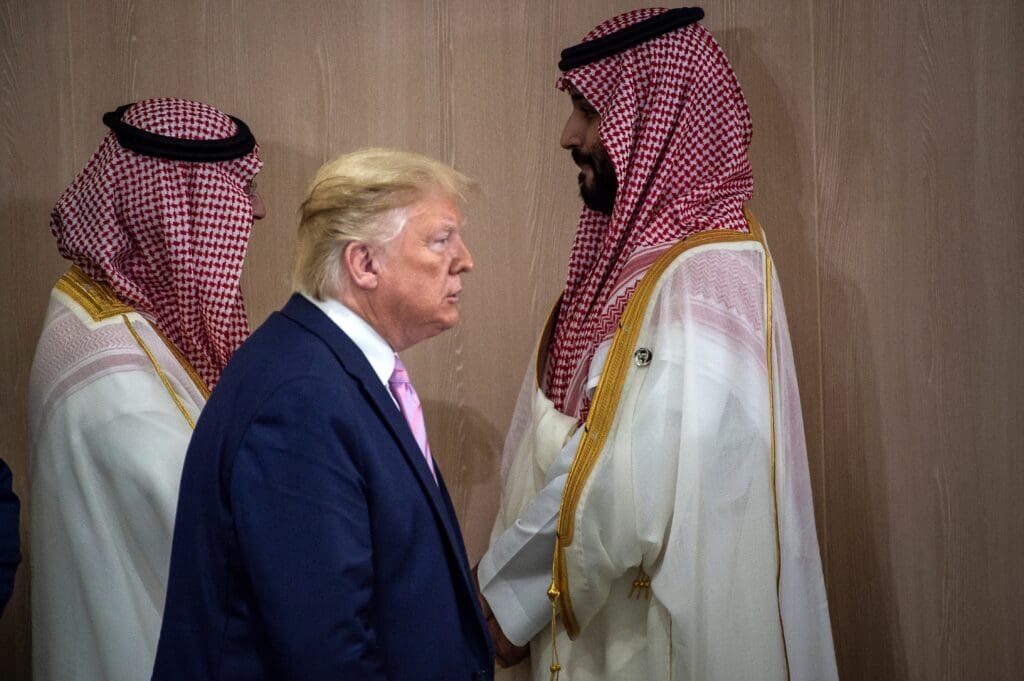President-elect Donald Trump’s first term in office reshaped U.S.-Gulf relations. His approach focused on cultivating personal bonds with leaders of Gulf Cooperation Council (GCC), signing massive arms deals, and for the most part not touching human rights issues. Gulf statesmen mostly welcomed this approach, which provided immediate defense assurances without challenging their sovereignty. However, with Trump’s return to office, GCC states face much uncertainty, particularly as global conflicts—from the Ukraine war to escalating conflicts in Gaza, Lebanon, Iran and Yemen —intensify existing regional pressures. Gulf leaders are increasingly navigating a multipolar world where alliances with China and Russia may offer alternatives to the U.S. as they confront regional challenges.
The Trump administration’s previous strategy was heavily rooted in transactionalism and an Israel-centric approach. But considering the complexities of today’s geopolitical landscape in the Gulf, policymakers in these states question whether purely transactional partnerships can meet their needs in terms of sustainable security and economic growth, which go hand in hand.
Trump’s Legacy in the Gulf
By emphasizing transactions, particularly around military and security ties, and refraining from criticizing domestic policies, Trump created a unique rapport with GCC members. Lucrative arms deals and military support bolstered the Gulf states’ defenses, especially against perceived threats like Iran. This contrasted sharply with the Obama administration, which, at least to a limited agree lectured about internal governance and issues such as democracy and human rights at the expense of good relations between the U.S. and some Gulf regimes.
However, Trump’s transactional approach came at a cost, sidestepping critical, underlying issues in the Gulf and across the region. The first Trump administration addressed Iran’s growing influence, the conflict(s) in Yemen, and Islamic State, but in a militaristic manner that did not necessarily consider the root causes of turmoil nor the deeper strategic needs of Gulf states. They now face an increasingly hostile landscape in the Middle East with the Gaza war expanding and the U.S. lacking a cohesive long-term strategy to help mitigate these threats.
Foremost among the security challenges that Gulf states must face is Iran’s continued influence and military presence across the Middle East. From supporting Hezbollah in Lebanon to backing Houthi rebels in Yemen and armed Palestinian factions in Gaza, Tehran has extended its reach, often targeting the interests of Saudi Arabia and the United Arab Emirates. Trump’s “maximum pressure” strategy involved withdrawing from the Iran nuclear deal and imposing heavy sanctions in order to cripple Iran and curb its influence.
Although Riyadh, Abu Dhabi and Manama welcomed this approach, “maximum pressure” ultimately failed to counter Tehran’s destabilizing activities, and in fact provoked Iran and its regional partners to punish those states by attacking Saudi Aramco infrastructure in 2019 and later the UAE. As a result, the Gulf states that were most supportive of Trump’s hawkish policies realized that they were on the frontlines of the regional confrontation with Iran and would suffer the most for supporting the pressure campaign—meaning that Trump’s policies ultimately left them more vulnerable than secure.
With Trump returning to the White House in January 2025, those Gulf states do not want to be pulled back into a confrontation with Iran, which they have recently repaired their relations with in order to de-escalate tensions and improve stability in the region. Indeed, there is considerable concern that the new administration will return to an aggressive posture without a path toward any viable endgame with Tehran. Ultimately, GCC members do not want the next U.S. administration to approach the Islamic Republic in a way that threatens to derail the Saudi and Emirati détente with Iran.
The war in Gaza has further complicated the Gulf’s security concerns. Qatar, Kuwait, and the UAE have tried to mediate between the different sides and/or provide humanitarian assistance, but are under increased pressure to balance their multiple interests. Existing under the U.S. security umbrella, all GCC members must consider how their responses to the Gaza war have the potential to play out negatively in Washington. Gulf states also do not seek any confrontations with Israel, a powerful regional country with nuclear weapons. At the same time, however, these Gulf leaders have domestic and regional constituents they must consider, and simply ignoring anti-Israeli sentiment among Arab populations is not an option.
Meanwhile, the Biden administration’s steadfast support for Israel has left Gulf leaders frustrated, feeling that the U.S. is neglecting their regional concerns in favor of unwavering alignment with Israel. Trump could deepen this rift if he maintains a similar stance. Alternatively, his second term could offer Gulf leaders a chance to advocate for a more balanced approach to the Israeli-Palestinian conflict. Without this balance, U.S. support for Israel risks fueling regional instability and straining U.S.-Gulf relations.
The tumultuous situation in Yemen also continues to unsettle the GCC states. Riyadh has spent the past few years engaging the Houthis via UN diplomats and Omani interlocutors in an effort to negotiate Saudi Arabia’s withdrawal from Yemen following its years-long disastrous military campaign against the Iran-backed rebels. Although Saudi-Houthi hostilities ceased in 2022, a concern in the kingdom is that regional conditions could trigger renewed fighting, possibly at the expense of the Saudi-Iranian détente. The U.S.-U.K. bombing of Houthi targets in Yemen in response to the maritime attacks has left most GCC states nervous and increasingly unsettled by Washington’s foreign policy decisions. Gulf leaders will want to see Trump push for a Gaza ceasefire rather than continue the Biden administration’s policies of waging military operations against the Houthis as a means of restoring stability in the Gulf of Aden and Red Sea.
A Global Pivot: Gulf States Look to China and Russia
The sense of frustration with shifting U.S. policies has led Gulf leaders to increasingly seek alternative alliances and partnerships with China and Russia. China, through its Belt and Road Initiative (BRI), has deepened its investments in Gulf infrastructure, technology and energy, providing much-needed economic diversification without corresponding political demands, a model that aligns well with Gulf leaders’ preference for sovereign autonomy.
Russia, meanwhile, has solidified its position as a critical energy and defense partner for the Gulf. Moscow’s influence in Syria and its willingness to engage diplomatically with both Iran and GCC states has positioned it as a power broker and security partner. Additionally, Russia’s energy collaboration with Gulf states through OPEC+ has allowed Moscow to strengthen its ties with Saudi Arabia and the UAE, influencing global oil prices and production. For Gulf leaders, building ties with Russia offers not only economic benefits but also an opportunity to balance U.S. influence, especially as the war in Ukraine highlights the limitations of traditional alliances and the importance of strategic autonomy.
If Trump returns to office and continues the short-term, transactional model of his previous administration, Gulf states may accelerate their partnerships with China and Russia to secure economic stability and security guarantees. A continued U.S. focus solely on defense pacts, without addressing broader economic and diplomatic needs, could push Gulf states further into Beijing and Moscow’s orbit of influence, fundamentally shifting the region’s alliances and reducing Washington’s influence.
Navigating an Uncertain Future in U.S.-Gulf Relations
As Gulf states contend with a volatile landscape shaped by regional conflicts, global power shifts, and intensifying competition among superpowers, they are re-evaluating their strategic alliances. A potential Trump administration may bring welcome stability in defense partnerships, but the transactional approach of his first term has proven insufficient for addressing the Gulf’s complex needs. Without a deeper commitment to diplomatic engagement, conflict resolution, and support for economic diversification, the U.S. risks ceding its influence in the Gulf to China and Russia, which GCC states in many ways view as easier powers to work with compared to the U.S.
When Trump returns to office, his administration will face pressure to balance immediate alliances and partnerships with a long-term strategy that addresses challenges in the Gulf. Failure to do so could lead to a significant realignment in the complex web of relationships in the Middle East with Gulf leaders turning to new partners. For U.S.-Gulf relations to thrive in the coming years, Washington must adapt to the Gulf’s evolving priorities—chiefly de-escalation of regional conflicts so they can focus on domestic diversification and reform programs—or risk losing its foothold in a region of critical strategic importance.


